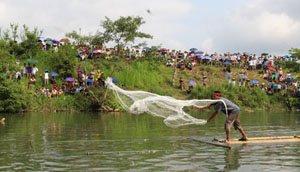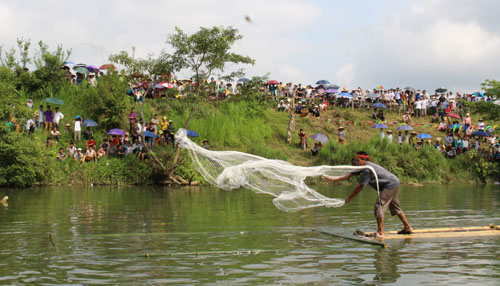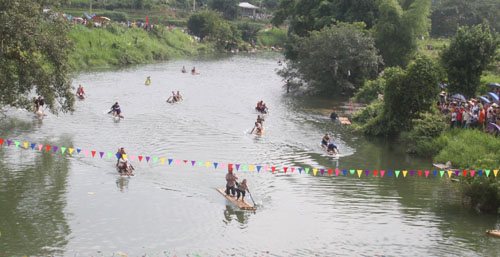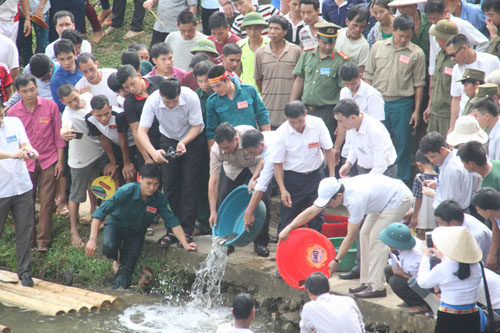
(HBO) – The traditional fish-catching festival of Muong ethnic minority people took place on May 10 in Tan Vuong hamlet, Lo Son commune, Tan Lac district, Hoa Binh province, attracting crowds of local residents and visitors.
Lo Son, a remote
commune of Tan Lac, where more than 6 km of Suoi
Cai (Cai stream) passes through. Water from small streams around Muong Bi
area gathers to create one large natural Cai stream with clean water, providing
shelter for many kinds of fish.
Muong people here have
organised the fish-catching festival on the third lunar month every year for
generations.

Local teams compete in
casting-net throwing competition
The festival included
two parts – a ritual ceremony and entertainment activities.
The ritual ceremony was
solemnly held at the hamlet’s shrine where a shaman performed rites to pray for
good weather, bumper crops, luck and health. After that, four young men carried
a raft to the stream and representatives of the hamlet and commune threw the
nets first.

Raft racing
Meanwhile, the locals
joined the festival’s entertainment activities in the stream’s Tro and Lo areas,
such as draft racing, casting-net throwing competitions, fish-catching contest,
and a fair of local farming products.

Leaders of the People’s Committee of Lo Son
commune and local people release fries into the stream
The annual festival
aimed to pay tribute to the Gods while preserving and promoting the local
cultural values. It also provided an opportunity for the local people to get
relaxed and increase solidarity as well as raised their awareness of protecting
the environment and natural resources and harms of the destructive fishing
practices like those using electricity and explosives.
It was part of events
in celebration of Tan Lac district’s 60th founding anniversary
(October 15, 1957-2017).
By Thu Thuy
With an increasingly vibrant and widespread emulation movement aimed at building cultured residential areas and cultured families, Yen Thuy District has been making steady progress toward improving both the material and spiritual well-being of its people, while fostering a civilized, prosperous, beautiful, and progressive community.
Once lacking recreational spaces and community facilities, Residential Group 2 in Quynh Lam Ward (Hoa Binh City) has recently received attention for the construction of a new, spacious, and fully equipped cultural house. The project followed the model of state support combined with public contributions in both labor and funding.
The "All people unite to build cultural life" movement, which has been effectively integrated with Kim Boi district’s socio-economic development goals, is fostering a lively spirit of emulation across local residential areas, hamlets, villages, public agencies, and enterprises. In addition, through the initiative, traditional cultural values are being preserved and promoted, while community solidarity and mutual support in poverty reduction and economic development are being strengthened.
A working delegation of the Hoa Binh provincial People’s Committee led by its Permanent Vice Chairman Nguyen Van Toan on June 11 inspected the progress of a project to build the Mo Muong Cultural Heritage Conservation Space linked to tourism services in Hop Phong commune, Cao Phong district.
Born and growing in the heroic land of Muong Dong, Dinh Thi Kieu Dung, a resident in Bo town of Kim Boi district, in her childhood was nurtured by the sweet lullabies of her grandmother and mother. These melodies deeply imprinted on her soul, becoming an inseparable part of her love for her ethnic group's culture. For over 20 years, this love for her hometown has driven Dung to research, collect, and pass down the cultural values of the Muong people to future generations.
In the final days of May, the Ethnic Art Troupe of Hoa Binh Province organized performances to serve the people in remote, mountainous, and particularly disadvantaged areas within the province. These were not just ordinary artistic shows, but they were the meaningful journeys aimed at spreading cultural values, enhancing the spiritual life of the people and contributing to the preservation of ethnic minority cultural identities.





